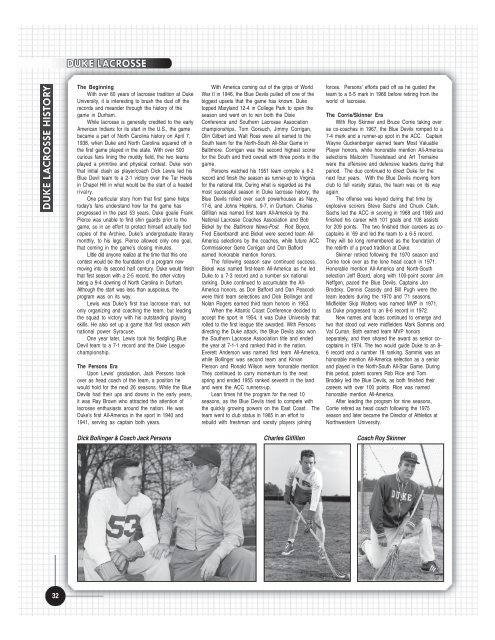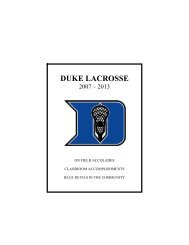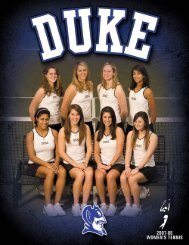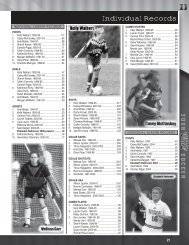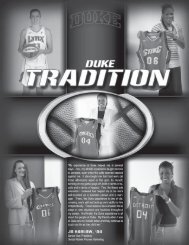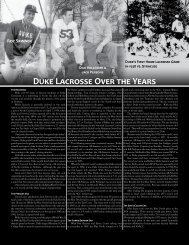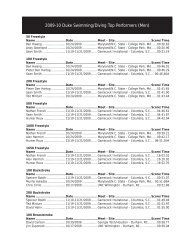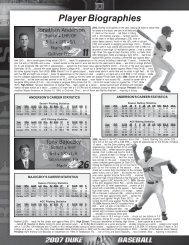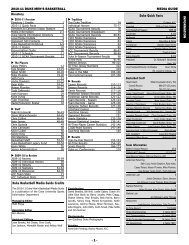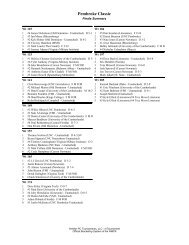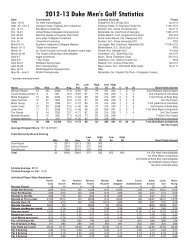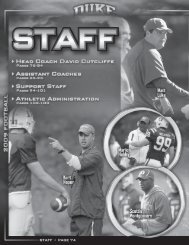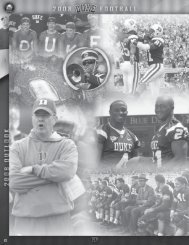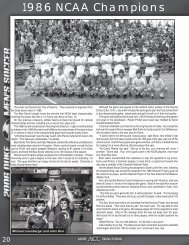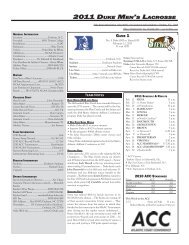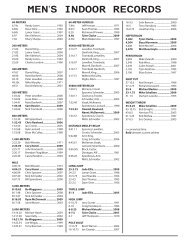Full page fax print - Duke University Athletics
Full page fax print - Duke University Athletics
Full page fax print - Duke University Athletics
You also want an ePaper? Increase the reach of your titles
YUMPU automatically turns print PDFs into web optimized ePapers that Google loves.
The Beginning<br />
With over 60 years of lacrosse tradition at <strong>Duke</strong><br />
<strong>University</strong>, it is interesting to brush the dust off the<br />
records and meander through the history of the<br />
game in Durham.<br />
While lacrosse is generally credited to the early<br />
American Indians for its start in the U.S., the game<br />
became a part of North Carolina history on April 7,<br />
1938, when <strong>Duke</strong> and North Carolina squared off in<br />
the first game played in the state. With over 500<br />
curious fans lining the muddy field, the two teams<br />
played a primitive and physical contest. <strong>Duke</strong> won<br />
that initial clash as player/coach Dick Lewis led his<br />
Blue Devil team to a 2-1 victory over the Tar Heels<br />
in Chapel Hill in what would be the start of a heated<br />
rivalry.<br />
One particular story from that first game helps<br />
today’s fans understand how far the game has<br />
progressed in the past 53 years. <strong>Duke</strong> goalie Frank<br />
Pierce was unable to find shin guards prior to the<br />
game, so in an effort to protect himself actually tied<br />
copies of the Archive, <strong>Duke</strong>’s undergraduate literary<br />
monthly, to his legs. Pierce allowed only one goal,<br />
that coming in the game’s closing minutes.<br />
Little did anyone realize at the time that this one<br />
contest would be the foundation of a program now<br />
moving into its second half century. <strong>Duke</strong> would finish<br />
that first season with a 2-5 record, the other victory<br />
being a 9-4 downing of North Carolina in Durham.<br />
Although the start was less than auspicious, the<br />
program was on its way.<br />
Lewis was <strong>Duke</strong>’s first true lacrosse man, not<br />
only organizing and coaching the team, but leading<br />
the squad to victory with his outstanding playing<br />
skills. He also set up a game that first season with<br />
national power Syracuse.<br />
One year later, Lewis took his fledgling Blue<br />
Devil team to a 7-1 record and the Dixie League<br />
championship.<br />
The Persons Era<br />
Upon Lewis’ graduation, Jack Persons took<br />
over as head coach of the team, a position he<br />
would hold for the next 26 seasons. While the Blue<br />
Devils had their ups and downs in the early years,<br />
it was Ray Brown who attracted the attention of<br />
lacrosse enthusiasts around the nation. He was<br />
<strong>Duke</strong>’s first All-America in the sport in 1940 and<br />
1941, serving as captain both years.<br />
With America coming out of the grips of World<br />
War II in 1946, the Blue Devils pulled off one of the<br />
biggest upsets that the game has known. <strong>Duke</strong><br />
topped Maryland 12-4 in College Park to open the<br />
season and went on to win both the Dixie<br />
Conference and Southern Lacrosse Association<br />
championships. Tom Gorsuch, Jimmy Corrigan,<br />
Olin Gilbert and Walt Ross were all named to the<br />
South team for the North-South All-Star Game in<br />
Baltimore. Corrigan was the second highest scorer<br />
for the South and third overall with three points in the<br />
game.<br />
Persons watched his 1951 team compile a 6-2<br />
record and finish the season as runner-up to Virginia<br />
for the national title. During what is regarded as the<br />
most successful season in <strong>Duke</strong> lacrosse history, the<br />
Blue Devils rolled over such powerhouses as Navy,<br />
17-6, and Johns Hopkins, 9-7, in Durham. Charles<br />
Gilfillan was named first team All-America by the<br />
National Lacrosse Coaches Association and Bob<br />
Bickel by the Baltimore News-Post. Rod Boyce,<br />
Fred Eisenbrandt and Bickel were second team All-<br />
America selections by the coaches, while future ACC<br />
Commissioner Gene Corrigan and Don Bafford<br />
earned honorable mention honors.<br />
The following season saw continued success.<br />
Bickel was named first-team All-America as he led<br />
<strong>Duke</strong> to a 7-3 record and a number six national<br />
ranking. <strong>Duke</strong> continued to accumulate the All-<br />
America honors, as Don Bafford and Dan Peacock<br />
were third team selections and Dick Bollinger and<br />
Nolan Rogers earned third team honors in 1953.<br />
When the Atlantic Coast Conference decided to<br />
accept the sport in 1954, it was <strong>Duke</strong> <strong>University</strong> that<br />
rolled to the first league title awarded. With Persons<br />
directing the <strong>Duke</strong> attack, the Blue Devils also won<br />
the Southern Lacrosse Association title and ended<br />
the year at 7-1-1 and ranked third in the nation.<br />
Everett Anderson was named first team All-America,<br />
while Bollinger was second team and Kirvan<br />
Pierson and Ronald Wilson were honorable mention.<br />
They continued to carry momentum to the next<br />
spring and ended 1955 ranked seventh in the land<br />
and were the ACC runners-up.<br />
Lean times hit the program for the next 10<br />
seasons, as the Blue Devils tried to compete with<br />
the quickly growing powers on the East Coast. The<br />
team went to club status in 1965 in an effort to<br />
rebuild with freshman and varsity players joining<br />
forces. Persons’ efforts paid off as he guided the<br />
team to a 5-5 mark in 1966 before retiring from the<br />
world of lacrosse.<br />
The Corrie/Skinner Era<br />
With Roy Skinner and Bruce Corrie taking over<br />
as co-coaches in 1967, the Blue Devils romped to a<br />
7-4 mark and a runner-up spot in the ACC. Captain<br />
Wayne Guckenberger earned team Most Valuable<br />
Player honors, while honorable mention All-America<br />
selections Malcolm Travelstead and Art Tremaine<br />
were the offensive and defensive leaders during that<br />
period. The duo continued to direct <strong>Duke</strong> for the<br />
next four years. With the Blue Devils moving from<br />
club to full varsity status, the team was on its way<br />
again.<br />
The offense was keyed during that time by<br />
explosive scorers Steve Sachs and Chuck Clark.<br />
Sachs led the ACC in scoring in 1968 and 1969 and<br />
finished his career with 101 goals and 108 assists<br />
for 209 points. The two finished their careers as cocaptains<br />
in ’69 and led the team to a 6-5 record.<br />
They will be long remembered as the foundation of<br />
the rebirth of a proud tradition at <strong>Duke</strong>.<br />
Skinner retired following the 1970 season and<br />
Corrie took over as the lone head coach in 1971.<br />
Honorable mention All-America and North-South<br />
selection Jeff Board, along with 100-point scorer Jim<br />
Neffgen, paced the Blue Devils. Captains Jon<br />
Brodsky, Dennis Cassidy and Bill Pugh were the<br />
team leaders during the 1970 and ’71 seasons.<br />
Midfielder Skip Walters was named MVP in 1971,<br />
as <strong>Duke</strong> progressed to an 8-6 record in 1972.<br />
New names and faces continued to emerge and<br />
two that stood out were midfielders Mark Sammis and<br />
Val Curran. Both earned team MVP honors<br />
separately, and then shared the award as senior cocaptains<br />
in 1974. The two would guide <strong>Duke</strong> to an 8-<br />
6 record and a number 18 ranking. Sammis was an<br />
honorable mention All-America selection as a senior<br />
and played in the North-South All-Star Game. During<br />
this period, potent scorers Rob Rice and Tom<br />
Brodsky led the Blue Devils, as both finished their<br />
careers with over 100 points. Rice was named<br />
honorable mention All-America.<br />
After leading the program for nine seasons,<br />
Corrie retired as head coach following the 1975<br />
season and later became the Director of <strong>Athletics</strong> at<br />
Northwestern <strong>University</strong>.<br />
Dick Bollinger & Coach Jack Persons<br />
Charles Gilfillan<br />
Coach Roy Skinner<br />
32


